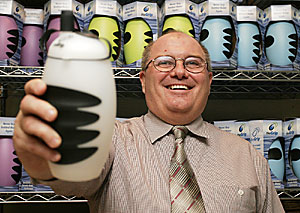 |
|
EVAN CARAVELLI/Arizona Daily Wildcat
|
Gary Payne, president of Tucson-based NviroHealth Inc., shows off "The Grip," a water bottle he designed to filter out 99.9 percent of bacteria and chlorine. UA hydrology scientists tested the bottle's patented filtration system.
|
|
|
By Mike DeStasio
Arizona Daily Wildcat
Tueday, December 7, 2004
Print this
With the help of hydrology and environmental experts at the UA, Gary Payne, president of NviroHealth Inc., designed a water bottle complete with its own filtration system, which is now available at the UofA Bookstore. The water bottle, called The Grip, will save users money and provide them with clean water at the same time, Payne said.
NviroHealth researches environmental pollution and its effects on humans, according to the company's Web site. After a friend got sick from such pollution, Payne said he wanted to find a way to improve the cleanliness of water in Tucson.
Payne said there are two main problems with water that comes into a person's home. First, it can contain bacteria, dangerous chemicals and cancer causing agents. Second, Tucson water travels through pipes installed in the 1860s. More than 140 years later, these iron pipes are beginning to erode.
As the pipes erode, tiny bits of metal break off into the water. When pipes break, water becomes contaminated, Payne said.
To solve this problem, as well as alleviate the high cost of bottled water, Payne developed The Grip, made with Environmental Protection Agency and Food and Drug Administration approved plastics, Payne said.
"The water bottle is made from the finest plastics. They're as good as anything you'd find in an industrial kitchen," Payne said. The bottle is also dishwasher safe.
After five years of research and development, The Grip was put on the market about a month ago, and has been available at the UofA Bookstore since then. Payne owns a patent on both the water bottle and the "Hydrol" filter it uses.
The Grip filters water through a 360-degree induction system made with hard block carbon. Water is pulled through the filter on all sides, unlike with the granulated activated carbon filter, Payne said. The Brita water filtration system uses a granulated activated carbon filter, or GAC, filter, Payne said.
The hard block carbon filter can purify 150 gallons of water before it needs to be replaced. In comparison, the GAC filter can only filter 20 gallons before wearing out, Payne said.
Replacement filters for The Grip cost $9.95 and last for approximately one to one and a half years. Those for other water filtration devices cost more than $25, and last only about three months, Payne said.
"I'd rather have one of those than a Brita," said Jacob Concannon, a political science junior. "$9.95 sounds like a great deal."
The plastic used to construct The Grip has been tested by the UA hydrology department, and PACE Laboratories, a facility that does testing for the EPA, Payne said.
Both the UA and PACE Labs found the "Hydro" filter cleanses water of 99.9 percent of bacteria and chlorine.
Concannon said The Grip seems practical because of the poor quality of water in Tucson.
"The water out of the faucet is so horrible," Concannon said. He said the fact that The Grip has a purifier would make him want to buy one.
The Grip is available at the UofA Bookstore for $29.95, and could save consumers $1,000 to $1,200 a year on bottled water, Payne said.
Ann Wolnick, a marketing specialist at the UofA Bookstore, said it is too early to tell how well The Grip is selling because it hasn't been available for very long.
"We have not even had time to photograph and market them," said Wolnick. "Once the ads are out, it will go fast."
Tim Plunkett, a political science sophomore, said The Grip is a good idea, and is something he would buy, but added it seems expensive.
"[The Grip] sounds pretty good. It could be cheaper than $30 if college students are buying it," Plunkett said.
Funding for The Grip came from Payne's Tucson-based company, NviroHealth Inc.
